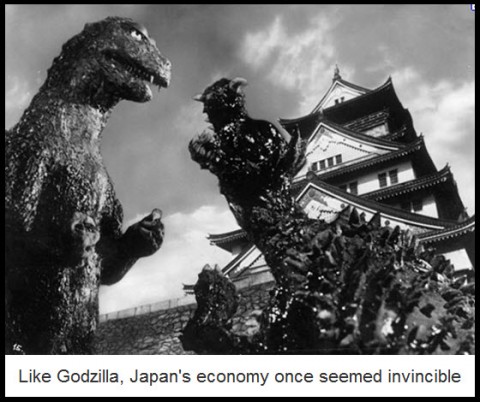[ Doug Graham, a frequent contributor to Rick’s Picks, finds striking similarities between the U.S. economy today and that of 1980s Japan just before the bottom dropped out. Can we change the big picture in time to prevent an economic collapse? Not likely, says Doug, who saw clouds gathering over Tokyo a generation ago, when he worked for a Japanese firm as a sales liaison to Compaq Computer in Houston. RA]
In the late 80’s I often visited Japan for work with the IC companies. It was an amazing time. They appeared rich and powerful. Their dominance was awesome, and with a little extrapolation it was obvious they would soon rule the world. They seemed unstoppable.
It was 1987 and I was employed by a Japanese IC maker and responsible for sales to Compaq Computer in Houston, Texas. For a twenty-something, it was a thrilling job. I was taking classes in Japanese. I’d visit Japan every few months. Two things jumped out at me regarding Compaq’s use of technology. Of course, they built computers, and computers were productivity machines, so they made sure that every Compaq employee had one and used it to its extreme. It made sense, since they could consume their own product and create their own productivity at cost. Second, e-mail. In 1988, Compaq was (internally) communicating like crazy electronically. 1988. Most companies weren’t and this was a great advantage. They ate their own cooking.
Juxtapose that with Tokyo: In nearly every department, on every story of our humongous Tokyo building: two rows of ten desks, butted up against each other. At the end of the row was one computer (they were extremely proud that they’d made it) which all twenty employees would share. Internal communication was in person or by phone or fax. Inefficiency by design. My thought was, “You guys are gonna get smoked! You have no idea how fast the Americans are running.” I am not condemning the Japanese, I am merely stating that they had a culture of inefficiency and the U.S. did not, and it would surely end the Japanese swagger. (Demographics is just another layer.)
Waste ‘Unstoppable’
It was soon to be over, and there was no way to save it unless they bit the bullet and dramatically changed, but change is difficult. Sound familiar? I feel the same way about anything connected to U.S. government. It simply cannot support its expense forever. Yet, nothing stops the waste: expenses rise while revenues decline. The departments, jobs, pensions. They all are at risk. And nothing will change because the system and its participants won’t allow change.
Regarding Japan, a generation later, all of this is obvious in the data. The Nikkei is down 75%. Most of this occurring in the ’90’s. Ditto for real estate. Total wealth has contracted back to 1980 levels! My point is this: Big trades are obvious, but the trees, the day-to-day action, the various articles screaming this or that, cloud the obvious. They call it “normalcy bias”. Critical thinking leads you elsewhere. Our big trade: The entire U.S. debt structure and the currency in which it is based must be bet against. Our public debt and unfunded commitments weigh heavily on all productivity. Sure, some entrepreneurs overcome it and their creativity gives us all benefits. I’ll suggest that unless they are inventing new, inexpensive energy, however, they are merely temporarily swimming against an overwhelming debt current.
The world is going through a gigantic upheaval in its currencies and its public debt structure, which are virtually one and the same. There is no way we can pay our debts without fantastically devaluing the currencies. Yet our government openly states that making government cuts will increase unemployment, and that it is therefore the wrong thing to do. Sounds Japanese to me.
(If you’d like to have Rick’s Picks commentary delivered free each day to your e-mail box, click here.)


Aramco gold coins/medallions:
sounds interesting!
In any case, the post about the military above is correct too, guns ensure acceptance of the dollar.
ANd its not just our guns forcing this on unwilling, irs also our guns helping the local oligarchs stay in power.
We have let them be so utterly corrupt for so long, they are completely dependent on the support we give, and will give, so long as they toe the line.
If they drop that, we drop them, but the localry will never thank these long term corrupts, but cashier them.
Thas how we use our guns in the M.E., the first is more often seen in Latin America